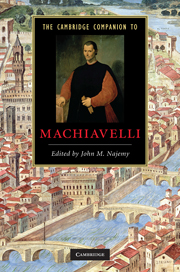Book contents
- Frontmatter
- Introduction
- 1 Niccolò Machiavelli: a portrait
- 2 Machiavelli in the chancery
- 3 Machiavelli, Piero Soderini, and the republic of 1494-1512
- 4 Machiavelli and the Medici
- 5 Machiavelli’s Prince in the epic tradition
- 6 Society, class, and state in Machiavelli’s Discourses on Livy
- 7 Machiavelli’s military project and the Art of War
- 8 Machiavelli’s Florentine Histories
- 9 Machiavelli and Rome: the republic as ideal and as history
- 10 Philosophy and religion in Machiavelli
- 11 Rhetoric and ethics in Machiavelli
- 12 Machiavelli and poetry
- 13 Comedian, tragedian: Machiavelli and traditions of Renaissance theater
- 14 Machiavelli and gender
- 15 Machiavelli’s afterlife and reputation to the eighteenth century
- 16 Machiavelli in political thought from the age of revolutions to the present
- Index
12 - Machiavelli and poetry
Published online by Cambridge University Press: 28 September 2010
- Frontmatter
- Introduction
- 1 Niccolò Machiavelli: a portrait
- 2 Machiavelli in the chancery
- 3 Machiavelli, Piero Soderini, and the republic of 1494-1512
- 4 Machiavelli and the Medici
- 5 Machiavelli’s Prince in the epic tradition
- 6 Society, class, and state in Machiavelli’s Discourses on Livy
- 7 Machiavelli’s military project and the Art of War
- 8 Machiavelli’s Florentine Histories
- 9 Machiavelli and Rome: the republic as ideal and as history
- 10 Philosophy and religion in Machiavelli
- 11 Rhetoric and ethics in Machiavelli
- 12 Machiavelli and poetry
- 13 Comedian, tragedian: Machiavelli and traditions of Renaissance theater
- 14 Machiavelli and gender
- 15 Machiavelli’s afterlife and reputation to the eighteenth century
- 16 Machiavelli in political thought from the age of revolutions to the present
- Index
Summary
Machiavelli's reputation rests above all on his political-historical writings, and secondarily on his notable contribution to the re-emergence of classicizing comic drama. Yet, as scholarship has increasingly shown, he was also profoundly engaged with poetry and poets, as reader and writer. This chapter focuses attention on four interrelated dimensions of Machiavelli's engagement with poetry: the “poetic” dimensions of the nonpoetic works (citations of and allusions to poetry, use of poetic devices and strategies); the poems he wrote; the poets he read (and more or less obliquely rewrote); and his “poetics,” that is, his concept(s) of what poetry is and what it does, and its relationship to other modes of discourse, particularly the political historical. What Machiavelli's “realism” consists of is a source of ongoing scholarly debate. The general perception that he had little patience for the world of imaginative fictions remains alive and well among readers of The Prince and the Discourses. For such readers, the fact that Machiavelli frequently names poets and allusively echoes poetry in these nonpoetic works has commonly been dismissed as attributable, on the one hand, to the fundamentally literary-rhetorical character of upper-class education in his time (which was immersed in classical Latin literature), and, on the other, to the increasing importance assigned by Florentine culture to its vernacular literary heritage, above all the newly canonized “three crowns” of the fourteenth century: Dante, Petrarch, and Boccaccio.
- Type
- Chapter
- Information
- The Cambridge Companion to Machiavelli , pp. 190 - 205Publisher: Cambridge University PressPrint publication year: 2010
- 4
- Cited by

